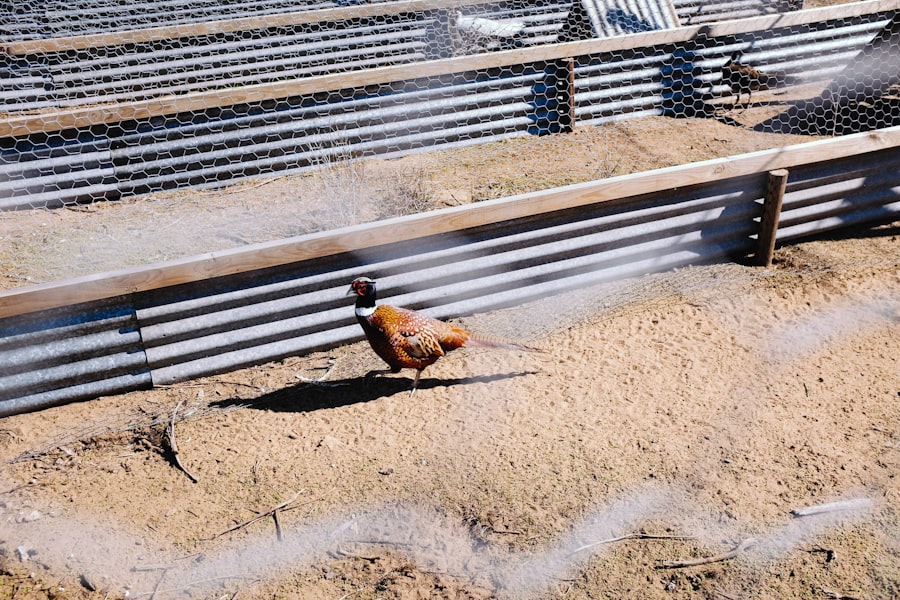Chickens are naturally curious and opportunistic animals that explore their environment in search of food and shelter. They are easily startled, which can result in erratic behavior such as wing flapping and circular running. Understanding these behavioral traits is essential for effectively deterring chickens from undesired areas.
Recognizing their natural instincts allows for the implementation of more effective strategies to prevent damage or nuisance. Chickens are social creatures that typically follow the lead of dominant flock members. When one chicken discovers a food source or potential nesting site, others are likely to follow.
This social dynamic implies that deterring individual chickens may not be sufficient to address the issue. Instead, strategies that discourage the entire flock from accessing an area may be necessary. Comprehending chicken behavior is crucial for developing effective deterrent methods to keep them away from unwanted locations.
Table of Contents
- 1 Creating Physical Barriers
- 2 Using Natural Deterrents
- 3 Implementing Scare Tactics
- 4 Keeping Food Sources Secure
- 5 Utilizing Repellents
- 6 Seeking Professional Help
- 7 FAQs
- 7.1 What are some effective ways to keep chickens out of the yard?
- 7.2 How high should a fence be to keep chickens out of the yard?
- 7.3 What are some natural deterrents to keep chickens out of the yard?
- 7.4 Are there any plants that can help keep chickens out of the yard?
- 7.5 What should I do if I find chickens in my yard?
Key Takeaways
- Chickens are naturally curious and will explore their surroundings, so understanding their behavior is key to keeping them away from certain areas.
- Physical barriers such as fences and netting can effectively keep chickens out of specific areas and protect gardens or crops.
- Natural deterrents like citrus peels, coffee grounds, or predator urine can be used to discourage chickens from entering certain areas.
- Scare tactics such as motion-activated sprinklers or noise-making devices can startle chickens and deter them from coming near a specific area.
- Keeping food sources secure and inaccessible to chickens can help prevent them from being attracted to certain areas.
- Repellents such as commercial sprays or homemade mixtures can be used to create unpleasant scents or tastes that deter chickens from specific areas.
- If all else fails, seeking professional help from a pest control expert or animal behavior specialist may be necessary to effectively manage chicken behavior.
Creating Physical Barriers
Installing Fences and Netting
One effective way to deter chickens from accessing unwanted areas is by creating physical barriers that prevent them from entering. This can include installing fences or netting around gardens or other vulnerable areas. The key is to make sure that the barriers are tall enough to prevent the chickens from flying over them and secure enough to prevent them from digging underneath.
Maintenance and Additional Barriers
Additionally, it’s important to regularly inspect and maintain these barriers to ensure that they remain effective over time. Another physical barrier that can be effective in deterring chickens is the use of motion-activated sprinkler systems. These devices are designed to detect movement and then spray a burst of water, startling and discouraging any chickens in the area.
Using Chicken Wire or Mesh Netting
In addition to fences and motion-activated sprinklers, another physical barrier that can be effective in deterring chickens is the use of chicken wire or mesh netting. These materials can be used to cover vulnerable areas such as vegetable patches or flower beds, preventing chickens from accessing them and causing damage. It’s important to ensure that the wire or netting is securely fastened and covers the entire area to be protected.
Using Natural Deterrents
In addition to physical barriers, natural deterrents can also be effective in keeping chickens away from unwanted areas. One such deterrent is the use of predator decoys, such as fake owls or hawks, which can create the illusion of danger and discourage chickens from entering the area. These decoys should be moved regularly to prevent chickens from becoming accustomed to their presence.
Another natural deterrent that can be effective in keeping chickens away is the use of strong-smelling plants or herbs. Chickens have a strong sense of smell and are often deterred by strong odors such as garlic, mint, or lavender. Planting these herbs around vulnerable areas can help to discourage chickens from entering and causing damage.
Additionally, the use of reflective surfaces such as aluminum foil strips or old CDs can also be effective in deterring chickens. The reflective surfaces create flashes of light and movement that can startle and discourage chickens from entering the area. By using natural deterrents such as predator decoys, strong-smelling plants, and reflective surfaces, it becomes possible to keep chickens away from unwanted areas without causing them harm.
In addition to physical barriers, natural deterrents can also be effective in keeping chickens away from unwanted areas. One such deterrent is the use of predator decoys, such as fake owls or hawks, which can create the illusion of danger and discourage chickens from entering the area. These decoys should be moved regularly to prevent chickens from becoming accustomed to their presence.
Another natural deterrent that can be effective in keeping chickens away is the use of strong-smelling plants or herbs. Chickens have a strong sense of smell and are often deterred by strong odors such as garlic, mint, or lavender. Planting these herbs around vulnerable areas can help to discourage chickens from entering and causing damage.
Additionally, the use of reflective surfaces such as aluminum foil strips or old CDs can also be effective in deterring chickens. The reflective surfaces create flashes of light and movement that can startle and discourage chickens from entering the area. By using natural deterrents such as predator decoys, strong-smelling plants, and reflective surfaces, it becomes possible to keep chickens away from unwanted areas without causing them harm.
Implementing Scare Tactics
Scare tactics can be an effective way to deter chickens from accessing unwanted areas. One common scare tactic is the use of loud noises, such as clapping or banging pots and pans together, which can startle and discourage chickens from entering the area. It’s important to vary the timing and location of these noises to prevent chickens from becoming accustomed to them.
Another scare tactic that can be effective in deterring chickens is the use of visual deterrents such as scarecrows or brightly colored flags. These visual deterrents create the illusion of danger and can discourage chickens from entering the area. It’s important to regularly move and change the appearance of these deterrents to prevent chickens from becoming accustomed to them.
Additionally, the use of motion-activated noise makers or ultrasonic devices can also be effective in deterring chickens. These devices are designed to detect movement and then emit a loud noise or high-pitched sound that startles and discourages any chickens in the area. By implementing scare tactics such as loud noises, visual deterrents, and motion-activated devices, it becomes possible to effectively deter chickens from accessing unwanted areas.
Scare tactics can be an effective way to deter chickens from accessing unwanted areas. One common scare tactic is the use of loud noises, such as clapping or banging pots and pans together, which can startle and discourage chickens from entering the area. It’s important to vary the timing and location of these noises to prevent chickens from becoming accustomed to them.
Another scare tactic that can be effective in deterring chickens is the use of visual deterrents such as scarecrows or brightly colored flags. These visual deterrents create the illusion of danger and can discourage chickens from entering the area. It’s important to regularly move and change the appearance of these deterrents to prevent chickens from becoming accustomed to them.
Additionally, the use of motion-activated noise makers or ultrasonic devices can also be effective in deterring chickens. These devices are designed to detect movement and then emit a loud noise or high-pitched sound that startles and discourages any chickens in the area. By implementing scare tactics such as loud noises, visual deterrents, and motion-activated devices, it becomes possible to effectively deter chickens from accessing unwanted areas.
Keeping Food Sources Secure
Chickens are often attracted to areas where they can find food sources such as gardens, compost piles, or outdoor dining areas. One effective way to deter them from accessing these areas is by keeping food sources secure and out of reach. This can include using sealed containers for compost or garbage, installing bird feeders with protective cages, or covering garden beds with netting or chicken wire.
Another way to keep food sources secure is by regularly cleaning up any spilled food or scraps in outdoor areas. By removing these temptations, it becomes less likely that chickens will be attracted to these spaces in search of a meal. Additionally, it’s important to secure any outdoor dining areas by promptly cleaning up any leftover food or scraps and using covers for outdoor tables and grills.
By keeping food sources secure and out of reach, it becomes possible to deter chickens from accessing these areas and causing damage. Chickens are often attracted to areas where they can find food sources such as gardens, compost piles, or outdoor dining areas. One effective way to deter them from accessing these areas is by keeping food sources secure and out of reach.
This can include using sealed containers for compost or garbage, installing bird feeders with protective cages, or covering garden beds with netting or chicken wire. Another way to keep food sources secure is by regularly cleaning up any spilled food or scraps in outdoor areas. By removing these temptations, it becomes less likely that chickens will be attracted to these spaces in search of a meal.
Additionally, it’s important to secure any outdoor dining areas by promptly cleaning up any leftover food or scraps and using covers for outdoor tables and grills. By keeping food sources secure and out of reach, it becomes possible to deter chickens from accessing these areas and causing damage.
Utilizing Repellents

Bitter-Tasting Repellents
One common repellent is the use of bitter-tasting sprays or powders that can be applied to vulnerable plants or surfaces. These repellents create an unpleasant taste for chickens when they attempt to peck at these areas, discouraging them from causing damage.
Citrus-Based Repellents
Another type of repellent that can be effective in deterring chickens is the use of citrus-based sprays or oils. Chickens are often deterred by strong citrus scents and flavors, making this type of repellent an effective option for protecting vulnerable areas.
Spicy Repellents
Additionally, the use of spicy sprays or oils can also be effective in deterring chickens. Chickens are sensitive to spicy flavors and scents, making this type of repellent an effective option for protecting vulnerable plants or surfaces.
By utilizing repellents such as bitter-tasting sprays, citrus-based sprays, and spicy sprays, it becomes possible to deter chickens from accessing unwanted areas without causing them harm.
Seeking Professional Help
In some cases, deterring chickens from accessing unwanted areas may require professional assistance. Pest control experts have experience in dealing with nuisance wildlife and can provide valuable insight into effective deterrent methods for keeping chickens away. Additionally, local agricultural extension offices may offer resources and guidance on managing chicken-related issues on residential properties.
These offices often have experts who specialize in wildlife management and can provide valuable advice on deterring chickens without causing harm. Furthermore, seeking professional help may also involve consulting with local farmers or poultry experts who have experience in managing chicken-related issues. These individuals may have valuable insights into effective deterrent methods based on their own experiences with raising and managing poultry.
In some cases, deterring chickens from accessing unwanted areas may require professional assistance. Pest control experts have experience in dealing with nuisance wildlife and can provide valuable insight into effective deterrent methods for keeping chickens away. Additionally, local agricultural extension offices may offer resources and guidance on managing chicken-related issues on residential properties.
These offices often have experts who specialize in wildlife management and can provide valuable advice on deterring chickens without causing harm. Furthermore, seeking professional help may also involve consulting with local farmers or poultry experts who have experience in managing chicken-related issues. These individuals may have valuable insights into effective deterrent methods based on their own experiences with raising and managing poultry.
In conclusion, understanding the behavior of chickens is essential in developing effective deterrent methods that will keep them away from unwanted areas. Creating physical barriers such as fences, netting, and motion-activated sprinkler systems can help prevent chickens from accessing vulnerable spaces. Using natural deterrents like predator decoys, strong-smelling plants, and reflective surfaces can also discourage them from entering unwanted areas without causing harm.
Implementing scare tactics such as loud noises, visual deterrents, and motion-activated devices can startle and discourage chickens from accessing unwanted spaces. Keeping food sources secure by using sealed containers for compost or garbage and promptly cleaning up any spilled food or scraps can also help deter them from causing damage. Utilizing repellents like bitter-tasting sprays, citrus-based sprays, and spicy sprays can discourage chickens without causing harm while seeking professional help may provide valuable insight into effective deterrent methods for keeping them away from unwanted areas.
If you’re looking for tips on how to keep chickens out of your yard, you may also be interested in learning about the best location for a chicken coop. Check out this article for advice on where to place your coop to minimize its impact on your yard and maximize the benefits for your chickens.
FAQs
What are some effective ways to keep chickens out of the yard?
Some effective ways to keep chickens out of the yard include installing a fence, using chicken wire or netting, using motion-activated sprinklers, and using natural deterrents such as citrus peels or vinegar.
How high should a fence be to keep chickens out of the yard?
A fence to keep chickens out of the yard should be at least 6 feet high to prevent them from flying over it. Additionally, the fence should be buried at least 6 inches into the ground to prevent chickens from digging underneath it.
What are some natural deterrents to keep chickens out of the yard?
Some natural deterrents to keep chickens out of the yard include citrus peels, vinegar, cayenne pepper, and garlic. These scents are unpleasant to chickens and can help deter them from entering the yard.
Are there any plants that can help keep chickens out of the yard?
Plants such as marigolds, lavender, and rosemary are known to repel chickens due to their strong scents. Planting these around the perimeter of the yard can help deter chickens from entering.
What should I do if I find chickens in my yard?
If you find chickens in your yard, it’s important to gently and calmly encourage them to leave. Avoid chasing or startling them, as this can cause stress and potentially harm the chickens. If the chickens belong to a neighbor, it’s best to communicate with them to find a solution.
Meet Walter, the feathered-friend fanatic of Florida! Nestled in the sunshine state, Walter struts through life with his feathered companions, clucking his way to happiness. With a coop that’s fancier than a five-star hotel, he’s the Don Juan of the chicken world. When he’s not teaching his hens to do the cha-cha, you’ll find him in a heated debate with his prized rooster, Sir Clucks-a-Lot. Walter’s poultry passion is no yolk; he’s the sunny-side-up guy you never knew you needed in your flock of friends!







